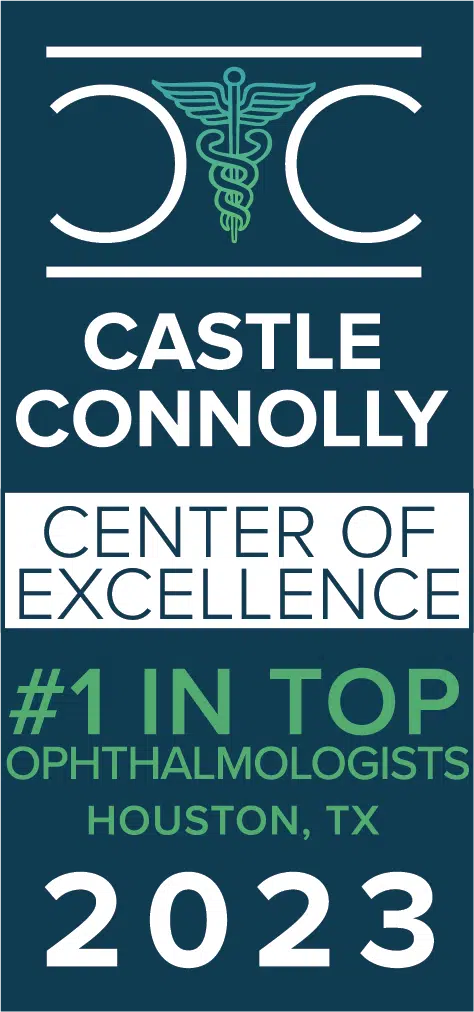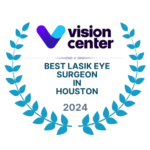Patient Experience
Welcome to Berkeley Eye Center – Texas’ Leading Eye Care Provider
With a reputation that spans more than 60 years, Berkeley Eye Center is recognized as one of Texas’ most established comprehensive eye care facilities.
In addition to our 25 clinics and optical locations located throughout the greater Houston area, we also offer patients the added access and convenience of six state-of-the art laser eye centers throughout Texas, and the Caplan Surgery Center, Katy Area Surgical Center & Grand Oaks Surgery Center, our Medicare-licensed ambulatory surgery centers for outpatient cataract care.


AWARD-WINNING DOCTORS
Today, Berkeley Eye Center includes 19 ophthalmologists and 33 optometrists, including Retina Specialists and doctors who specialize in cornea, dry eyes, specialty contact lens fittings and more. Our doctors and practices have received numerous awards and recognitions. Here are a few of the recent ones.
 Castle Connolly Top Doctors
Castle Connolly Top DoctorsCastle Connolly’s Top Doctors uses a rigorous research process to hand select doctors that meet criteria in areas such as professional qualifications, education, hospital and faculty appointments, research leadership, professional reputation, disciplinary history, and patient outcomes.
Robert E. Coffee, M.D. – Castle Connolly Top Doctor: 2023 – 2024
Thomas Marshall, M.D. – Castle Connolly Top Doctor: 2010 – 2024
Matthew B. McCauley, M.D. – Castle Connolly Top Doctor: 2020 – 2024
Brent R. McQueen, M.D. – Castle Connolly Top Doctor: 2023 – 2024
J. Morgan Micheletti, M.D. – Castle Connolly Rising Star: 2022 – 2024
Bac T. Nguyen, M.D. – Castle Connolly Top Doctor: 2021 – 2024
Frank J. Ruda, M.D. – Castle Connolly Top Doctor: 2023 – 2024
Adam L. Spengler, M.D. – Castle Connolly Top Doctor: 2023 – 2024
Regina Sun, M.D. – Castle Connolly Top Doctor: 2018 – 2024
Eunice E. Yook, M.D. – Castle Connolly Top Doctor: 2022 – 2024
 Super Doctors
Super DoctorsMichael B. Caplan, M.D. – named by his peers to the Super Doctors® list in 2012, 2013, 2014, 2015, 2016, 2017, 2018, 2019, 2020, 2021 and 2022.
Matthew B. McCauley, M.D. – named by his peers to the Super Doctors® Rising Stars list in 2012, 2013 and 2014, and to the Super Doctors® list in 2015, 2016, 2017, 2018, 2019, 2020, 2021, and 2022.
Regina L. Sun, M.D. – named by her peers to the Super Doctors® Rising Stars list in 2016 and 2017, and to the Super Doctors® list in 2018, 2019, 2020, 2021, and 2022.
Morgan Micheletti, M.D. – named by his peers to the Super Doctors® Rising Stars list in 2020, 2021 and 2022.
Adam L. Spengler, M.D. – named by his peers to the Super Doctors® Rising Stars list in 2016, 2017, and 2018.
 Houston Chronicle Top Workplaces
Houston Chronicle Top WorkplacesBerkeley Eye Center is honored to be recognized by the Houston Chronicle on the list of Top Workplaces in Houston, our 11th time on the list.
2023 – 1 of only 26 companies recognized by the Houston Chronicle as a “Top Workplace 2023” in Houston, competing against other large companies and national brands.
2022 – 1 of only 30 companies recognized by the Houston Chronicle as a “Top Workplace 2022” in Houston, and the first time we have been recognized in the Large Company category, competing against many big companies and national brands.
2021 – 1 of only 175 companies recognized by the Houston Chronicle as a “Top Workplace 2021” in Houston.
2020 – 1 of only 130 companies recognized by the Houston Chronicle as a “Top Workplace 2020” in Houston.
2017 – 1 of only 150 companies recognized by the Houston Chronicle as a “Top Workplace 2017” in Houston.
2016 – 1 of only 150 companies recognized by the Houston Chronicle as a “Top Workplace 2016” in Houston.
2015 – 1 of only 150 companies recognized by the Houston Chronicle as a “Top Workplace 2015” in Houston.
2014 – 1 of only 150 companies recognized by the Houston Chronicle as a “Top Workplace 2014” in Houston.
2013 – 1 of only 150 companies recognized by the Houston Chronicle as a “Top Workplace 2013” in Houston.
2012 – 1 of only 100 companies recognized by the Houston Chronicle as a “Top Workplace 2012” in Houston.
2011 – Berkeley Eye Center met the National Standards of “Top Workplaces 2011” as published by The Houston Chronicle, Sunday, Nov.6, 2011.
 Vitals Patients Choice Awards
Vitals Patients Choice AwardsPatients’ Choice recognition reflects the difference a particular physician has made in the lives of his/her patients. The honor is bestowed to physicians who have received near perfect scores, as voted by patients.
Michael B. Caplan, M.D. – 2014, 2015, 2016, 2017, 2018, and 2020. Dr. Caplan also received the Patients’ Choice 5th Anniversary Award in 2020. The 5 Year Honoree is a recognition granted only to those doctors whose ratings have reflected excellence in care for five years in a row. Only 1% of all doctors in the United States are bestowed this honor by their patients.
Robert E Coffee, M.D. – 2017, 2018
Erin A. Doe, M.D. – 2008, 2009, 2010, 2011, 2012. Dr. Doe also received the Patients’ Choice 5th Anniversary Award in 2012. The 5 Year Honoree is a recognition granted only to those doctors whose ratings have reflected excellence in care for five years in a row. Only 1% of all doctors in the United States are bestowed this honor by their patients.
Matthew B. McCauley, M.D. – 2016, 2018, 2020
Regina L. Sun, M.D. – 2014, 2015, 2016, 2017, 2018, 2020. Dr. Sun also received the Patients’ Choice 5th Anniversary Award in 2020. The 5 Year Honoree is a recognition granted only to those doctors whose ratings have reflected excellence in care for five years in a row. Only 1% of all doctors in the United States are bestowed this honor by their patients. She was also a Top 10 Doctor in 2014
Donna M. Talluto, M.D. – Top 10 Doctor in 2014
Usha Pinninti, M.D. – 2016
 Patients’ Top Choice Awards
Patients’ Top Choice AwardsThe Patients’ Top Choice Awards recognizes doctors who have top marks across all patient-rated categories, according to US News & World Report.
Michael B. Caplan, M.D.
Erin A. Doe, M.D.
Matthew B. McCauley, M.D.
K. Ray Shrum, M.D.
Regina L. Sun, M.D.
Donna M. Talluto, M.D.
 Best Cataract Surgeons in America
Best Cataract Surgeons in AmericaThe Best Cataract Surgeons in America is a prestigious title given to exceptional surgeons after they undergo an extensive of review of their Education & Training, Experience, Peer Reviews and Patient Feedback, available Technological Equipment, and Overall Quality of their practice.
Morgan Micheletti, M.D. – 2022
 Houstonia Magazine Top Doctors
Houstonia Magazine Top DoctorsHoustonia’s Top Doctors is a list of doctors from across many specialties who are singled out as exceptional in an extensive peer-review process.
Bac Nguyen, M.D. – 2022
 Best Doctors in America
Best Doctors in AmericaMichael B. Caplan, M.D. – Elected by his peers for inclusion in best Doctors in America® from 2011 to 2014.
Ralph G. Berkeley, M.D. – Elected by his peers for inclusion in best Doctors in America® from 2007 to 2014
 Vision Center Best LASIK Surgeon in Houston
Vision Center Best LASIK Surgeon in HoustonVision Center helps connect patients with the best healthcare providers in their area by analyzing reviews to narrow the field, and then hand picking the best of the best from the finalists. Their criteria include:
- Qualifications and education
- Years of experience
- Reputation and resources
- Past customer experiences
2024 – One of only 13 LASIK providers chosen in the Houston area.
2023 – One of 13 LASIK providers in the Houston area out of 193 reviewed.









